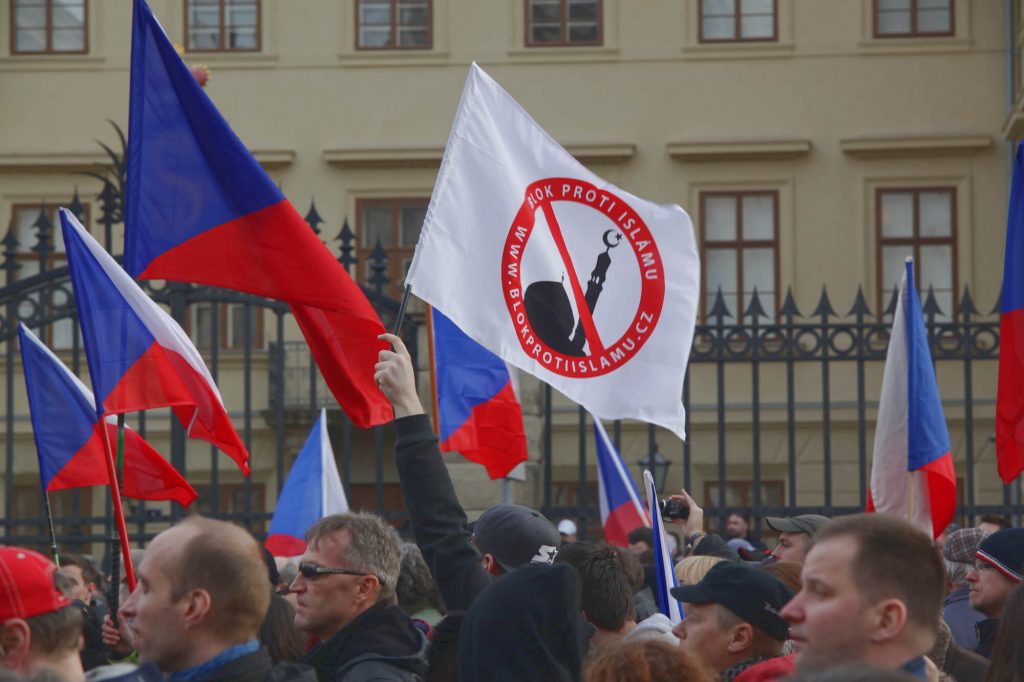by Sandra Abdelbaki
“I felt like I was stuck. And I felt at some point I was indirectly being told to go home and that I was not welcomed because the university and the governmental institutions made it extremely difficult for me to stay in the country.”
Holding the Arab immigrant identity in the Czech Republic is a constant struggle to feel like you belong, especially if you do not fit into the traditional mold of being a “first-world citizen”. You’re faced with all sorts of barriers preventing you from fully participating in Czech society — whether it’s through the institutions or the community.

The Czech Republic and its stance on immigration
The Czech Republic previously experienced a communist era where it had a relatively closed-off policy towards immigration. Historically, the country had a low level of immigration, but there has been a shift towards more restrictive and discriminatory policies in the wake of the 2015 refugee crisis. The country consequently implemented stricter immigration measures, including tightening residency requirements and reducing refugee quotas. This discrimination is fuelled by a rise of populist, anti-immigrant, and xenophobic sentiment, which is exemplified in political speeches expressing racist views on migrants or Islam.
There is no official number of Muslims or Arabs in the Czech Republic. But, according to estimates, around 20,000 Muslims live in the country, thousands of whom are Arab immigrants. However, they comprise less than 0.2% of the population. As the Muslim and Arab population is relatively small in the Czech Republic, there is a lack of infrastructure and resources. Finding spaces to express one’s religious or national identity becomes challenging.
It is worth mentioning that there is often confusion between Arab and Muslim identities in the West, where being Arab is frequently equated with being Muslim, resulting in anti-Muslim or anti-Arab sentiments being interrelated – perpetuating stereotypes.
Bureaucratic challenges and feeling unwelcomed
Being Arab in the Czech Republic can be daunting, where basic Arab characteristics can get in the way of attaining your rights as a citizen. They are often subject to institutionalised racism, hate speech, and accessing basic facilities like accommodation, bank accounts, and job markets. They are constantly questioned about their motives by police – facing difficulties in applying for residency permits. The media environment adds to that by reinforcing demeaning narratives about Arabs or Muslims, making it harder for them to integrate into society due to negative predispositions against their culture.
“I think the Czechs are cautious about any outsiders given the unfortunate history of war and invasions they experienced over the last decades. Often after friendly conversations, many Czechs tell me that I am the first Arab they met, and that they are happy that they had a better experience from what the negative stereotypes the media portray about Arabs,” said Ahmed, a 30-year-old Egyptian and resident of the Czech Republic.
While immigration seems like a viable option on the surface, more often than not it is a false democratic choice, migrants of the global south can make. Several Arabs reported it feels like fighting an unspoken hurdle when applying for or extending their residency permits which are not found outwardly in the law but behind-the-scenes bureaucracy.
Kais Guesmi is from Tunis and has lived in the Czech Republic for almost 14 years after marrying a Czech woman. Following years of living legally in the country – fulfilling all obligations as a citizen, he applied for Czech citizenship — supposedly as one of his rights. After much back and forth with the Czech Immigration Office, his citizenship got rejected, and as he reported, the reasons remain anonymous. He did not receive a clear answer as to why it was rejected although his documents met requirements.
“The only reason I received for my rejection is that I might be a threat to the national security and sovereignty of the Czech Republic. Although I filed an appeal, they didn’t do anything about it and simply claimed that it is a secretive file,” said Guesmi. “If I want to be honest with you, it’s not really about citizenship but rather being discriminated against with no viable reason other than my nationality.”
The discriminatory barriers place Arabs at a disadvantage, and feelings of the “other” becomes a part of their extremely politicised identity where they are either treated as labourers with expectations to benefit the country or they are simply tools for xenophobic propaganda. Either way, a heavy feeling of guilt and alienation weighs them down constantly with every interaction.
Marwa Garawit, a 28-year-old Moroccan, came to the Czech Republic to pursue her Master’s degree in International Diplomatic Studies – planning to continue her Ph.D. However, she faced several complications with her residency permit that did not allow her to stay in the country.
“It was extremely difficult for me to cooperate with the Czech Institutions. There are too many bureaucratic problems to deal with like the long waiting time between each appointment and the language barrier,” Garawit shared her experience while trying to extend her residency permit. “Every time I have to deal with the ministries, I expect that I will be insulted and then sent back home. There is always a feeling of humiliation that comes with it.”
Garawit also expressed that she faced challenges in communication with her university professors and accommodation where she felt she was not given space to express herself freely and voice her problems. After failing to extend her residency permit due to bureaucratic problems and not receiving cooperation from the immigration office, she had no choice but to leave the country.
“I felt like I was stuck. And I felt at some point I was indirectly being told to go home and that I was not welcomed because the university and the governmental institutions made it extremely difficult for me to stay in the country,” said Garawit.
Despite the challenges, Arabs in the Czech Republic have managed to carve out spaces for themselves whether it’s through their kebab shops scattered around corners of the cities or meaningful interactions with locals and internationals. However, full integration will require a collective, comprehensive approach from local and international governments and media – with more inclusive, protective policies – snapping out of the Czech bubble.
© 2023
